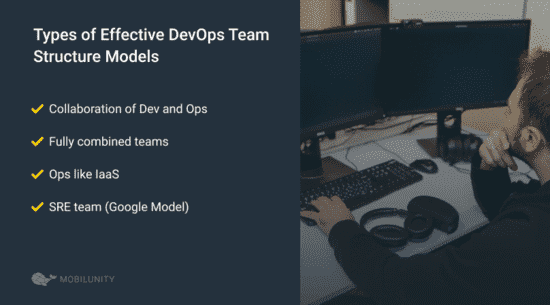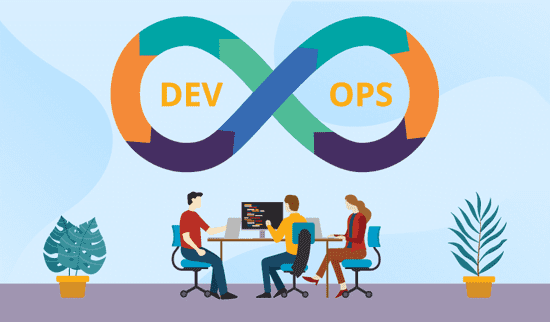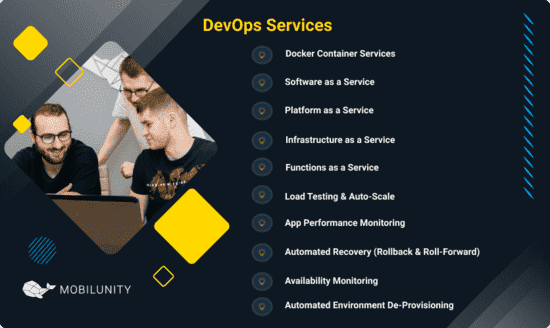While DevOps teams were previously only needed in large IT corporations, it is now becoming clear that DevOps specialists benefit any company or startup that works closely with application development or server management.
Massively influenced by the pandemic, the digital market is growing by leaps and bounds as more and more industries expand into virtual space. Such a raise is noticed by the Allied Market Research team that predicts DevOps market size to reach $57.90 billion by 2030 from $ 6.78 billion in 2020.
For survival in a highly fast-changing internet environment, digital products require DevOps transformation. The company must secure continuous software delivery and release automation by gathering the in-office DevOps specialists or hiring qualified DevOps remote teams.
Why Dedicated DevOps Team Is Crucial for the Company?
The maximum deficit in DevOps engineers is felt in companies that provide many end-user services such as banks, Internet providers, gigantic online platforms like Amazon, Facebook, and Netflix. With the rise of IT startups that manage similar projects or digital products, the demand for DevOps experts also significantly increased.
Implementing DevOps into the development process from the get-go makes all stages more fluid and faster, decreasing the risk of development slow-down if errors are found at later stages. A strong DevOps team in your company can help you avoid human errors by automating the tasks associated with configuring and deploying applications and optimize the resource use.
Having DevOps engineers can help speed up development cycles and quickly implement bug fixes and updates without complications at any stage of development. They constantly monitor the environment and production stages and implement configuration management systems, virtualization solutions, and cloud-based resource balancing tools.
Main Tasks of Professional DevOps Team
Ideally, the DevOps team bridges the gap between development and operations teams. The amount of tasks that can be solved and managed by the DevOps team is vast, including container services, load testing, monitoring, and automated recovery.
At every step, DevOps engineers help developers and testers solve many specific technical problems, such as:
- Provide feedback on failures during the build phase to quickly fix problems for developers. Ongoing feedback reduces the time for fixing and searching bugs.
- Offer optimized automation of pipeline build and release. It helps to minimize manual efforts and organize deployment, sequentially speeding up the delivery of the result.
- Manage infrastructure. It includes server management at any stage, QA, pre-production, and production. Using cloud services like AWS can help to partly optimize these processes.
How to Build a Strong DevOps Team at the Enterprise
Back in 2013, Matthew Skelton and Manuel Pais proposed a variety of DevOps team structures to optimize the software development process. The idea has been refined and updated many times over almost the decade, offering several basic types of DevOps implementation in a company.

Type 1: Close Cooperation of Dev and Ops
Such structure implies having different software development and implementation teams that interact at the appropriate stages or work together. A company can hire several teams for each independent product.
Type 2: Fully combined teams
The company may not have a visible division into Op and Dev, and the team works on all stages together. For example, such commands are effective for digital products like Netflix or Facebook. It is better used for organizations with a single product.
Type 3: Ops like IaaS (infrastructure as a service)
If application development is carried out on public clouds. The DevOps team will act as an expert center for providing metrics, feedback, and server deployment with a more elastic infrastructure.
Type 4: SRE Team (Google Model)
The structure of this model lies in the transfer of tasks after the app launch to the team responsible for Site Reliability Engineering. Thus, the development team hands over the data and metrics to the SRE team; further responsibility for the application’s operation lies with the latter team.
Type 5: DevOps as an external service
Smaller companies can use an intermediary or remote DevOps company to get qualified staff to perform DevOps tasks. It is a budget-safe option for organizations that need to automate infrastructure or develop a new environment. This type can also be implemented as a limited lifetime DevOps team hire type.
You also want read : How agile marketers can take a page from DevOps teams
Final Thoughts.
Implementing DevOps practices can require a lot of effort and be time-consuming. But once the company manages to streamline this process and find a dedicated expert DevOps team, it will be simpler to develop autonomous, flexible, and adaptable digital products. Using the expertise of DevOps engineers, the work of other teams will also be smoother and faster, while the risk of significant losses due to human error is negligible.


